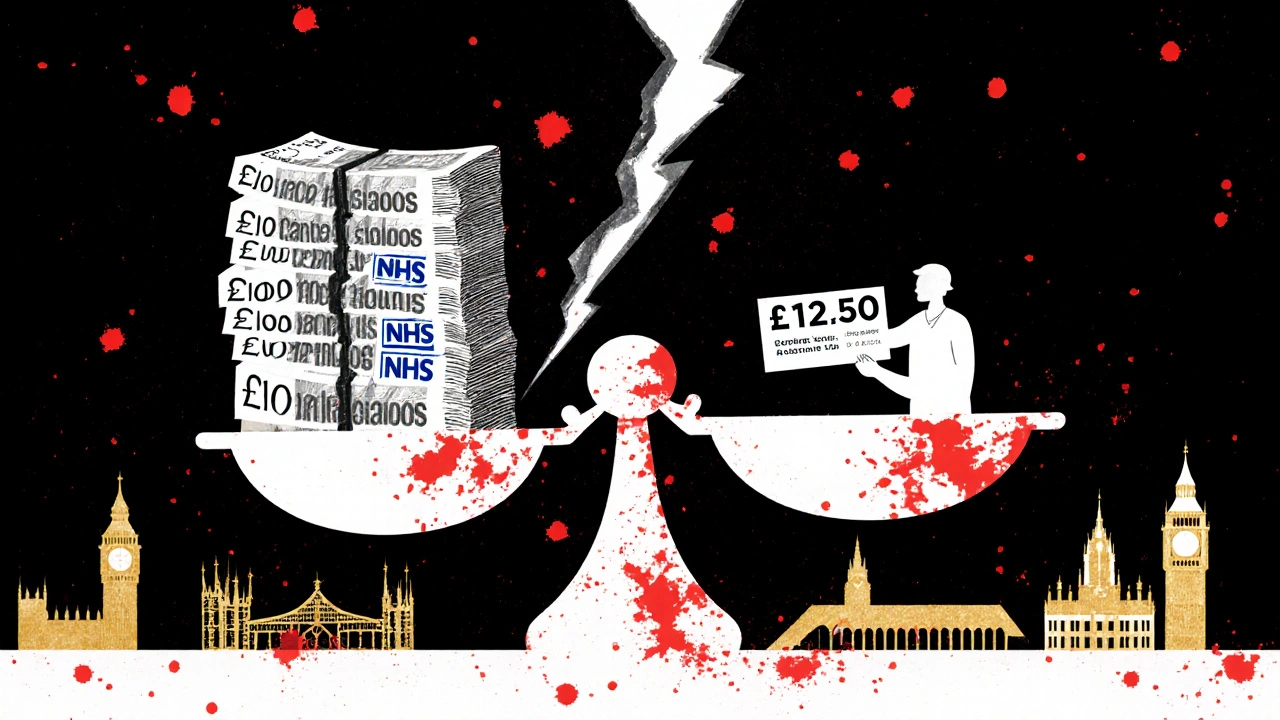
The UK economy isn’t broken-it’s stuck. After years of pandemic recovery, Brexit adjustments, and rising interest rates, growth has flatlined. Inflation is down from its 2022 peak, but prices are still 18% higher than they were in 2019. Wages are rising, but not fast enough. Households are spending less. Businesses are holding off on hiring. And Scotland? It’s feeling the pinch harder than most.
Productivity hasn’t moved in 15 years
The UK produces less output per hour worked than nearly every other major advanced economy. Germany, France, and even Italy are outpacing us. Why? Because too many businesses still rely on manual processes, outdated tech, and undertrained staff. A 2024 Bank of England report found that UK firms invest just 2.1% of GDP in digital tools-half what Germany spends. In Scotland’s manufacturing sector, over 40% of small businesses still use paper-based inventory systems. That’s not just inefficient-it’s expensive. When you can’t produce more with the same number of workers, wages stagnate and prices rise.
Inflation didn’t disappear-it just changed shape
Inflation hit 11% in 2022. By mid-2025, it’s down to 2.3%. Sounds good, right? But the cost of essentials hasn’t dropped. Food prices are still 22% above pre-pandemic levels. Energy bills, even with price caps, are 35% higher than in 2019. Rent in Glasgow and Edinburgh has jumped 28% since 2020. Meanwhile, the cost of childcare has doubled in a decade. People aren’t spending less because they’re being careful-they’re spending less because they can’t afford more. The average UK household now spends 41% of its income on housing, energy, and food. In 2010, it was 31%.
Public debt is crushing future options
The UK government owes more than £2.5 trillion. That’s 98% of GDP-up from 85% in 2019. Interest payments alone now cost £100 billion a year. That’s more than the entire annual budget for the NHS. Every pound spent on debt interest is a pound not spent on schools, roads, or social care. Scotland’s public finances are even tighter. The Scottish Government receives 82% of its funding from Westminster, but its tax revenues have grown slower than England’s since 2016. That means fewer resources to fix crumbling infrastructure or support small businesses in rural areas.

Labour shortages aren’t temporary-they’re structural
After Brexit, the UK lost around 600,000 EU workers. Many didn’t come back. In Scotland, the impact is clear: 1 in 5 farm jobs are unfilled. Care homes in Aberdeen and Inverness are running at 70% staffing. The NHS in Glasgow has 12,000 vacant roles. The problem isn’t just immigration policy-it’s pay and conditions. A care worker in Dundee earns £12.50 an hour. In Germany, it’s £19. In Sweden, it’s £22. The UK can’t attract workers by offering less. And without enough people to do the work, businesses can’t grow. Hospitals cancel surgeries. Restaurants close early. Factories run half-shifts.
Scotland’s economy is being left behind
Scotland contributes 8% of UK GDP but gets just 6% of public investment. The oil and gas sector, once a lifeline, is shrinking fast. North Sea production fell 40% between 2019 and 2025. Renewable energy is growing-but slowly. Offshore wind projects are delayed by planning bottlenecks. The Highlands and Islands still lack reliable broadband. Meanwhile, Edinburgh and Glasgow are seeing a brain drain. Young professionals are moving to Dublin, Amsterdam, or even Lisbon for better pay, housing, and work-life balance. In 2024, net migration out of Scotland hit its highest level since 2008.

Investment is fleeing, not flowing
Foreign direct investment into the UK fell 32% between 2020 and 2025. Companies are choosing Poland, Portugal, and even Mexico over Britain. Why? Uncertainty. The UK has changed its rules on corporate taxes, environmental standards, and labour laws more than any other G7 country since 2016. Investors want stability. They don’t want to guess whether next year’s regulations will make their business unprofitable. In Scotland, the situation is worse. A 2025 survey of 200 tech startups found that 68% said they’d consider relocating to Ireland if funding or talent became harder to find.
What’s the real fix?
There’s no magic wand. But there are clear steps. First, invest in productivity-modernise factories, train workers, and upgrade digital infrastructure. Second, fix public finances by stopping wasteful spending and making tax collection fairer. Third, raise wages in low-paid sectors so people can afford to live. Fourth, give Scotland more control over its own economic levers-tax, energy, and skills funding. Without those, the UK won’t just stay stuck-it’ll keep falling behind.
Is the UK economy worse than other European countries?
Yes, in key areas. The UK has the lowest productivity growth of any G7 nation since 2010. Its GDP per capita growth has lagged behind France, Germany, and Canada. While inflation is now under control, the UK still has the highest cost of living in Western Europe after Switzerland and Norway. Unemployment is low, but that’s because many people have left the workforce entirely-not because jobs are plentiful.
Why is Scotland’s economy struggling more than England’s?
Scotland has a smaller, more concentrated economy. It relies heavily on oil and gas, which are declining, and public sector jobs, which are under pressure. It also gets less investment per person than England. While London and the Southeast benefit from global finance and tech hubs, Scotland’s urban centres face higher housing costs and lower wage growth. Rural areas are losing population and services. The fiscal transfer system means Scotland gets less funding than it needs to match its population’s needs.
Are rising interest rates to blame?
They’re a major factor. The Bank of England raised rates to 5.25% in 2023 to fight inflation. That made mortgages, business loans, and credit card debt much more expensive. Homeownership dropped to its lowest level in 20 years. Small businesses delayed expansion. Consumer spending fell sharply in 2024. While higher rates helped bring inflation down, they also choked off growth. The economy is now caught between inflation and stagnation.
Can Scotland’s independence solve the economic problems?
Independence wouldn’t automatically fix anything. A separate Scotland would still face the same global pressures: aging population, low productivity, and energy transition costs. It would also lose access to the UK’s financial markets and fiscal buffers. On the other hand, independence could give Scotland control over taxation, energy policy, and immigration-tools it currently lacks. But without a clear plan for replacing the £15 billion annual deficit it runs with Westminster, independence would likely make short-term economic pain worse.
What’s the biggest myth about the UK economy right now?
That inflation is gone so everything’s fine. Inflation may be low, but the damage it caused remains. Households are $5,000 poorer on average than they were in 2019, adjusted for income. Businesses are drowning in debt. Public services are underfunded. The economy isn’t recovering-it’s just surviving. Real recovery means higher wages, better productivity, and more investment-not just lower price increases.
Comments (11)
-
John Fox October 29, 2025
The UK's just stuck in neutral while everyone else is accelerating. No magic fixes, just slow painful work. Productivity's the real ghost in the machine.
Nothing changes if nothing's done.
-
Tasha Hernandez October 29, 2025
Oh wow so the economy's 'stuck' like a toddler with a juice box? Congrats, you've diagnosed the problem after 18 years of ignoring it. Meanwhile my rent doubled, my paycheck didn't, and the government's still throwing money at airports nobody uses. Wake up and smell the austerity.
And don't even get me started on how Scotland's being bled dry while London hoards everything like a dragon with a spreadsheet.
-
Anuj Kumar October 30, 2025
They want you to think this is about productivity or inflation but it's not. It's the deep state. The EU never left. They're still pulling strings through the Bank of England. Watch the numbers. They're rigged. The real problem? Globalists want Britain weak so they can move the money to Dubai and Singapore. Scotland's just a pawn. You think the oil decline is coincidence? Think again.
-
Christina Morgan October 31, 2025
I love how this post breaks down the systemic issues without fluff. The productivity gap is staggering - and it’s not about laziness. It’s about decades of underinvestment in tech and training. I worked in a Manchester factory last year - they still used clipboards for inventory. In Germany, they have AI-driven logistics. It’s not a cultural thing. It’s policy failure. And Scotland? They’ve been begging for control over energy and skills funding since 2014. The UK keeps saying ‘no’ while pretending it’s surprised businesses are leaving.
Real recovery needs autonomy + investment. Not slogans.
-
Kathy Yip October 31, 2025
i keep thinking about how wages are rising but not enough… like, if you’re working 60 hours a week and still can’t afford childcare, is that really a ‘recovery’? it feels like we’re all just treading water while the rich get richer and the government talks about ‘fiscal responsibility’ like it’s a virtue and not a cage.
also why does no one talk about how much of the debt is from bailing out banks in 2008? just wondering.
-
Bridget Kutsche November 2, 2025
This is such a clear-eyed breakdown. I’ve been telling my friends for years: inflation isn’t gone, it’s just hidden in rent and groceries. And the care worker pay gap? Criminal. Germany pays nearly double. Why? Because they value people. The UK values profits. Fixing this isn’t about politics - it’s about dignity. Invest in people, not just debt interest. Scotland needs its own tax powers. Full stop. We’re not asking for handouts - we’re asking for fairness.
-
Jack Gifford November 3, 2025
Let’s be real - the UK’s productivity problem isn’t tech. It’s management. I’ve seen too many British firms hire consultants to ‘optimize’ instead of just giving workers better tools and time. And don’t get me started on the ‘work harder’ culture. No one’s working harder than the NHS nurses or the warehouse staff. The problem is leadership that thinks efficiency means cutting staff, not upgrading systems.
Scotland’s brain drain? That’s the result of 15 years of neglect. People leave because they’re not valued. Not because they’re lazy.
-
Sarah Meadows November 3, 2025
Who gave these left-wing economists the keys to the kingdom? The UK economy is fine. It’s the EU and globalist elites that want to destroy British sovereignty. Brexit was the first step. Now they want to blame everything on ‘productivity’ to make us feel guilty for wanting control. Scotland? It’s a fiscal black hole. Independence would be economic suicide. We need stronger borders, lower taxes, and less bureaucracy - not more handouts to Glasgow and Edinburgh.
-
Nathan Pena November 4, 2025
The data here is superficial. You cite GDP per capita without adjusting for purchasing power parity. You mention ‘productivity’ but ignore labor force participation rates, which have collapsed due to early retirement and disability claims - a direct result of welfare dependency. The real issue? The UK has become a post-industrial welfare state masquerading as a capitalist economy. The solution isn’t more investment - it’s structural retrenchment. Eliminate non-essential public spending. Privatize what’s left. And stop romanticizing Scotland’s decline as a moral tragedy. It’s economics, not opera.
-
Mike Marciniak November 5, 2025
They’re lying about inflation. The real number is 12%. They changed how they calculate it. Food prices? They don’t count the 30% increase in meat and bread because it’s ‘seasonal’. The Bank of England is part of the global reset. They want you broke so you’ll accept digital currency and lose your freedom. Scotland’s being sacrificed to make England look better. Don’t believe the headlines. The system is rigged.
-
VIRENDER KAUL November 6, 2025
It is a matter of profound regret that the United Kingdom has failed to maintain its industrial and fiscal discipline. The abandonment of manufacturing, the erosion of skilled labor training, and the systemic underinvestment in infrastructure are not accidental; they are the result of decades of ideological drift. The Scottish fiscal imbalance is not a regional issue but a national failure of governance. Until the Westminster establishment embraces merit-based economic policy over identity-driven redistribution, the decline will accelerate. The numbers do not lie. The data is irrefutable. The time for denial has expired.
